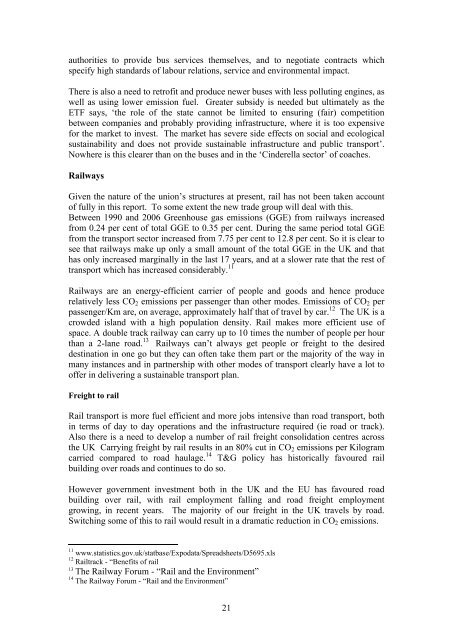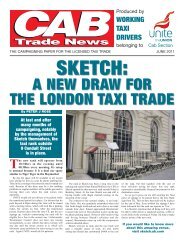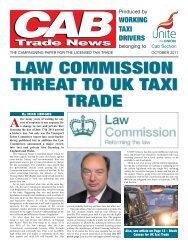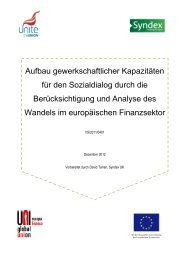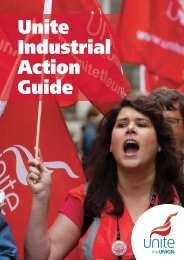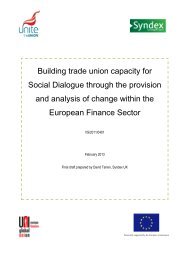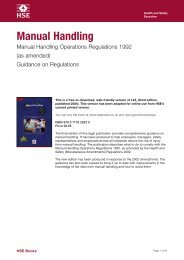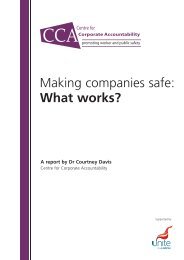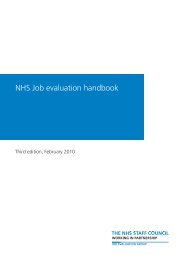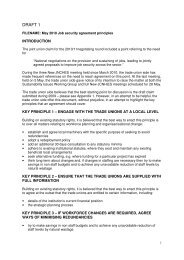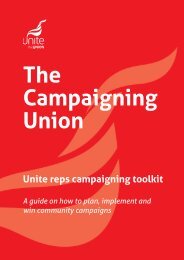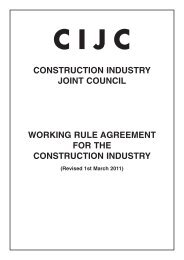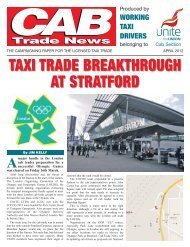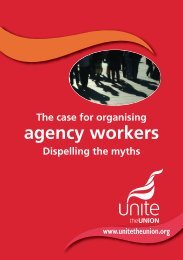Sustainable Transport and the Environment Guide - Unite the Union
Sustainable Transport and the Environment Guide - Unite the Union
Sustainable Transport and the Environment Guide - Unite the Union
You also want an ePaper? Increase the reach of your titles
YUMPU automatically turns print PDFs into web optimized ePapers that Google loves.
authorities to provide bus services <strong>the</strong>mselves, <strong>and</strong> to negotiate contracts which<br />
specify high st<strong>and</strong>ards of labour relations, service <strong>and</strong> environmental impact.<br />
There is also a need to retrofit <strong>and</strong> produce newer buses with less polluting engines, as<br />
well as using lower emission fuel. Greater subsidy is needed but ultimately as <strong>the</strong><br />
ETF says, ‘<strong>the</strong> role of <strong>the</strong> state cannot be limited to ensuring (fair) competition<br />
between companies <strong>and</strong> probably providing infrastructure, where it is too expensive<br />
for <strong>the</strong> market to invest. The market has severe side effects on social <strong>and</strong> ecological<br />
sustainability <strong>and</strong> does not provide sustainable infrastructure <strong>and</strong> public transport’.<br />
Nowhere is this clearer than on <strong>the</strong> buses <strong>and</strong> in <strong>the</strong> ‘Cinderella sector’ of coaches.<br />
Railways<br />
Given <strong>the</strong> nature of <strong>the</strong> union’s structures at present, rail has not been taken account<br />
of fully in this report. To some extent <strong>the</strong> new trade group will deal with this.<br />
Between 1990 <strong>and</strong> 2006 Greenhouse gas emissions (GGE) from railways increased<br />
from 0.24 per cent of total GGE to 0.35 per cent. During <strong>the</strong> same period total GGE<br />
from <strong>the</strong> transport sector increased from 7.75 per cent to 12.8 per cent. So it is clear to<br />
see that railways make up only a small amount of <strong>the</strong> total GGE in <strong>the</strong> UK <strong>and</strong> that<br />
has only increased marginally in <strong>the</strong> last 17 years, <strong>and</strong> at a slower rate that <strong>the</strong> rest of<br />
transport which has increased considerably. 11<br />
Railways are an energy-efficient carrier of people <strong>and</strong> goods <strong>and</strong> hence produce<br />
relatively less CO 2 emissions per passenger than o<strong>the</strong>r modes. Emissions of CO 2 per<br />
passenger/Km are, on average, approximately half that of travel by car. 12 The UK is a<br />
crowded isl<strong>and</strong> with a high population density. Rail makes more efficient use of<br />
space. A double track railway can carry up to 10 times <strong>the</strong> number of people per hour<br />
than a 2-lane road. 13 Railways can’t always get people or freight to <strong>the</strong> desired<br />
destination in one go but <strong>the</strong>y can often take <strong>the</strong>m part or <strong>the</strong> majority of <strong>the</strong> way in<br />
many instances <strong>and</strong> in partnership with o<strong>the</strong>r modes of transport clearly have a lot to<br />
offer in delivering a sustainable transport plan.<br />
Freight to rail<br />
Rail transport is more fuel efficient <strong>and</strong> more jobs intensive than road transport, both<br />
in terms of day to day operations <strong>and</strong> <strong>the</strong> infrastructure required (ie road or track).<br />
Also <strong>the</strong>re is a need to develop a number of rail freight consolidation centres across<br />
<strong>the</strong> UK Carrying freight by rail results in an 80% cut in CO 2 emissions per Kilogram<br />
carried compared to road haulage. 14 T&G policy has historically favoured rail<br />
building over roads <strong>and</strong> continues to do so.<br />
However government investment both in <strong>the</strong> UK <strong>and</strong> <strong>the</strong> EU has favoured road<br />
building over rail, with rail employment falling <strong>and</strong> road freight employment<br />
growing, in recent years. The majority of our freight in <strong>the</strong> UK travels by road.<br />
Switching some of this to rail would result in a dramatic reduction in CO 2 emissions.<br />
11 www.statistics.gov.uk/statbase/Expodata/Spreadsheets/D5695.xls<br />
12 Railtrack - “Benefits of rail<br />
13<br />
The Railway Forum - “Rail <strong>and</strong> <strong>the</strong> <strong>Environment</strong>”<br />
14 The Railway Forum - “Rail <strong>and</strong> <strong>the</strong> <strong>Environment</strong>”<br />
21


